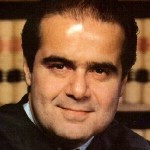The Mystery Of Eugene Scott: MU Law School’s First (?) African-American Male
Although the career of Mabel Raimey, the first black woman to attend Marquette Law School is well documented — see Phoebe Williams’ wonderful article in the Marquette Law Review — we do not know with certainty the name of the first African-American male.
For the post-1908 period, when the Milwaukee Law School became part of Marquette University, Eugene W. Scott appears to be a likely candidate for the institution’s first African-American student. Scott was one of the 46 first-year students enrolled in the Law School’s day program in the fall of 1911. (One of his classmates was future dean Francis X. Swietlik.) He is also one of 35 students listed as “Day Juniors” in the following year’s College of Law bulletin. His photograph also appears as “E. W. Scott” in the Class of 1914 group picture which currently hangs in the hallway outside the Dean’s Office on the first floor of Sensenbrenner Hall.
There is also evidence that Scott did well as a student at Marquette.
His picture appeared in the July 1913 edition of The Crisis, the magazine of the National Association of Colored People, with the note that he was competing for the senior oratorical prize. However, in spite of his photograph appearing in the above-mentioned class picture, he is not listed among the 18 individuals who received law degrees at the 1914 commencement. It was not necessary to graduate from law school to practice law in Wisconsin in 1914, and Scott, like many of the law students of that era, may have left without graduating. However, his appearance in the class photograph suggests that his decision must have been a last-minute one. It is, of course, possible that he failed his final law school exams.
We actually know very little about Scott, either before or after he attended Marquette. Entries in the 1912 and 1913 Marquette Law School bulletins list him as a resident of Milwaukee, but a search of the 1910 United States Census shows that there were only three Eugene Scotts in Wisconsin that year, and none of the three were black or of an age that would match Scott’s photographs in The Crisis or at the Law School. However, the 1910 Census does list an African-American named Eugene W. Scott living in Chicago. That Eugene Scott was born in 1883, and was then working as a waiter in a hotel while living in a boarding house. If this is the Eugene Scott who enrolled at Marquette in 1911, he would have been 27 or 28 years old at that time.
Scott apparently moved to Janesville, Wisconsin, after leaving Marquette, and in January 15, 1915, he corresponded with Mary Childs Nerney, the secretary of the NAACP, regarding efforts to protest the recently released film Birth of a Nation, which cast African-Americans in a bad light. Later that year, the Chicago Defender, a leading black newspaper, published a letter from Scott regarding his efforts to protest the showing of the film in Janesville, which included an appearance before the Janesville City Council.
What happened to Scott after 1915 is not known. He does not show up in Wisconsin in the 1920 Census, but a Eugene W. Scott does show up as living in Buffalo, New York. This Eugene Scott was also born in 1883 in Mississippi, as was the Eugene Scott listed as living in Chicago in 1910. This Eugene Scott was elected president of the Buffalo chapter of the Colored American Workmen’s League in 1919. Following his election, Scott delivered a eulogy for the recently deceased Theodore Roosevelt, whom Scott described as “the greatest friend of the Negro in American public life since Abraham Lincoln.”
After 1920, the record goes blank. There is no mention of a Eugene W. Scott born in 1883 in Mississippi in the 1930 United States Census. More evidence may be forthcoming, but for now Eugene Scott, likely the first black student to enroll in the Marquette Law School, remains a man of mystery.
While Scott may have been the first black student to enroll at the Marquette College of Law, there was at least one black student at the Milwaukee Law School, its predecessor institution. The career of Horace Scurry will be the subject of the next entry in this series.

 As a Catholic whose views are in line with those of Pope Benedict XVI, US Supreme Court Justice Antonin Scalia personally opposes abortion.
As a Catholic whose views are in line with those of Pope Benedict XVI, US Supreme Court Justice Antonin Scalia personally opposes abortion.